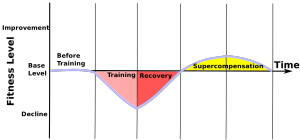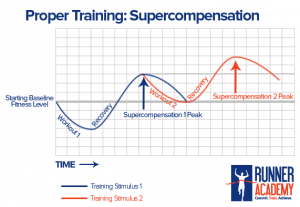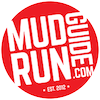
While this is a great policy for many aspects of life, it also directly applies to training. As much as this seems counter-intuitive, view tough workouts as things that break you down both mentally and physically. In comparison, rest days and easy workouts build up your mental and physical toughness. It can be difficult to find the proper balance between work and recovery. A start is establishing that there should always be more recovery than work.
The simplest example is that for every day you spend working hard; you need another to recover. For anyone who’s felt delayed onset muscle soreness, you know that the day after you work hard, your muscles are sore doing little activities like walking down stairs can be excruciating. Imagine trying to work hard on those legs. It’s just impossible: you’re breaking down muscle fibers that are already frayed. Instead, the smart thing is to recover until your muscles are stronger than they were before you are ready for hard work.
 Recovery days are not just for sitting on the couch; they are for recovery miles. Recovery miles should be run at a slow enough pace that your heart rate does not go above 80% of your maximum heart rate (generally maximum heart rate is 220-age). However, your speed should be fast enough that your gait does not change substantially. Easy runs should be no more than 60 minutes. At that point, the consistent pace is going to do more harm than good. These miles train your bones, joints and ligaments to be comfortable with the pressures that distance running places on them. When you combine your warm up, cool down and rest intervals from hard days plus recovery day miles, they should, at least, add up to more than your total hard miles.
Recovery days are not just for sitting on the couch; they are for recovery miles. Recovery miles should be run at a slow enough pace that your heart rate does not go above 80% of your maximum heart rate (generally maximum heart rate is 220-age). However, your speed should be fast enough that your gait does not change substantially. Easy runs should be no more than 60 minutes. At that point, the consistent pace is going to do more harm than good. These miles train your bones, joints and ligaments to be comfortable with the pressures that distance running places on them. When you combine your warm up, cool down and rest intervals from hard days plus recovery day miles, they should, at least, add up to more than your total hard miles.
All of this also applies to exercises of mental toughness, including your home & work life. If you’re exhausted from a long hard day at work, you can still find the energy to go out for your workout. If you do this day after day, without some break for something enjoyable, then that’s a recipe for burnout. As much as we train to work through physical pain using mental toughness, your mind is a muscle as well. Each time you tax it to overcome a challenge, it needs time and energy to recover. Mental burnout is just a precursor to physical burnout. So don’t forget to take care of your happiness along your training journey.
Subtip:
The OCR community is still small, and many people have difficulty finding fellow OCR enthusiasts in their local communities. Novices and people considering their first event are looking at who does these things. They’re looking to be inspired and motivated. We all know how one event can be the start of a new way of life. As veterans, we should think about how to support and encourage everyone in the sport. If each one of us aims to do that for at least one other person, then our sport can and will continue to grow, and we will have more than enough quality events put on by quality companies than we know what to do with.
Medical/Legal Disclaimer: The advice in this article is based on experience and opinion and may not apply to your specific situation. You are responsible for your health care decisions. Wesley Kerr (Dr. Redtights) is a medical student and a research doctor (Ph.D.) and is not yet a medical doctor. If you are concerned about a specific situation, please follow the advice of a medical professional familiar with your health and your specific case.


Leave A Comment